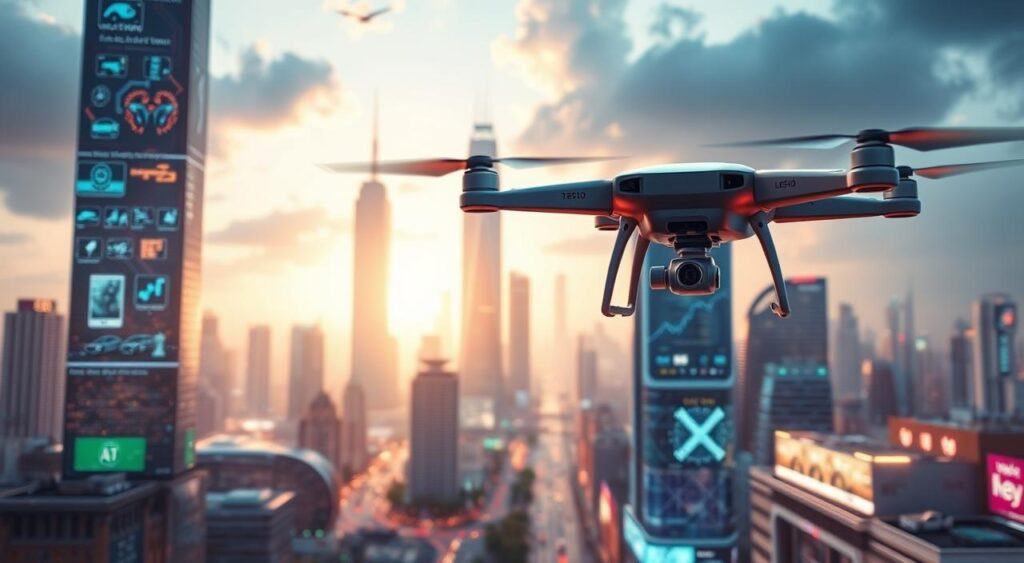Exploring technology, it’s clear that AI Trends are changing how we live and work. Artificial intelligence is making big changes in many industries.
I’ll look into the latest artificial intelligence trends and what they mean for the future. These trends include new ways to improve customer service and make operations more efficient.
Knowing what these trends mean for the future helps us get ready for new tech advancements.
The Evolution of Artificial Intelligence
Looking into AI’s history, we see major milestones that have changed tech. These moments are key to understanding AI’s role today.
A Brief History of AI
The idea of AI started in the mid-20th century with the first AI programs. These early programs were basic but set the stage for today’s AI.
AI’s growth has been slow but steady, especially in machine learning advancements. This part of AI lets machines learn from data, making them smarter and more useful.
Key Milestones in AI Development
There have been many important moments in AI’s history. One early achievement was the first AI program, designed to solve problems and make decisions like a human.
- The 1980s saw the creation of expert systems, which could mimic human decision-making.
- In the 1990s and 2000s, machine learning emerged, allowing AI to learn from data.
- Recently, deep learning has made big strides in image and speech recognition.
These milestones have pushed AI forward and opened doors for its use in many areas. They’ve shaped the future of AI technology.
Current Trends in AI Technology
AI is changing fast, bringing new trends to tech. These changes are making old tech better and opening up new areas for use in many fields.
Machine Learning Innovations
Machine learning is leading the way in AI, with big steps forward in deep learning. These innovations are improving predictive analytics, helping businesses make better choices. For example, deep learning helps predict market trends and spot risks in finance.
The latest in deep learning is also changing healthcare. It’s helping doctors analyze medical images and diagnose diseases better. This could change patient care by catching diseases early and treating them sooner.
Natural Language Processing Improvements
Natural Language Processing (NLP) is getting better, making it easier for humans and computers to talk. NLP is helping create virtual assistants that understand and answer questions better.
These improvements are also helping in customer service. AI chatbots are now giving personalized support to customers. This makes customers happier and helps human support agents work less.
Computer Vision Advancements
Computer vision is also advancing fast. It’s being used to make image recognition systems that can spot objects, people, and patterns very accurately.
- Applications in security and surveillance
- Use in autonomous vehicles
- Enhancements in medical imaging analysis
These advances are set to spark more innovation across many industries, from retail to healthcare.
AI in Everyday Life
AI is changing how we use technology every day. It makes our lives easier and more efficient. AI-powered devices and services are everywhere.
AI is big in smart home devices. These devices learn what we like and adjust settings for us. This makes our homes more comfortable.
Smart Home Devices
Smart home devices, like thermostats and lights, can be controlled from our phones or with voice commands. For example, Nest thermostats adjust the temperature based on our schedules and preferences.
- Smart thermostats adjust temperature based on your schedule.
- Smart lighting systems can be controlled remotely or set to automatic modes.
- Home security systems can be monitored and controlled through AI-powered apps.
Recent AI industry news shows the smart home market is growing fast. This growth is thanks to AI and IoT advancements.

Virtual Assistants
Virtual assistants like Amazon Alexa and Google Assistant are key to our daily lives. They can do many things, like set reminders and control smart devices.
- Set reminders and calendar events with voice commands.
- Control smart home devices for a seamless experience.
- Access information on demand, such as news updates or weather forecasts.
As cognitive computing updates improve virtual assistants, they get better at understanding us. They can answer our questions more accurately.
In summary, AI is changing our daily lives with smart home devices and virtual assistants. As these technologies get better, we’ll see even more cool uses in the future.
The Role of AI in Business
AI has a big impact on business, making things more innovative and efficient. It helps improve customer experiences and makes operations better.
AI trends are changing how businesses talk to their customers. Now, companies can offer experiences that fit what each customer likes and does.
Enhancing Customer Experience
Tools like chatbots and virtual assistants use AI to help customers 24/7. They make answers faster and solve problems better.
AI also helps businesses understand what customers do. This lets them make their marketing better and keep customers more engaged.
Optimizing Operations
AI makes business operations more efficient and cheaper. For example, AI can predict when machines will break down. This cuts down on downtime and saves on repair costs.
AI also helps with supply chain management. It can manage inventory, predict demand, and improve logistics. This makes operations run smoother.
Using AI, businesses can stay ahead and make more money. As AI keeps getting better, its role in business will grow. This will lead to even more innovation and efficiency.
Ethical Considerations in AI
As we advance in AI, we must think about its ethics. AI is now part of our lives, making it crucial to innovate responsibly.
Creating AI that helps society means looking at many ethical points. One big challenge is fixing bias in AI. If not handled, it can make social problems worse.
Balancing Innovation and Responsibility
AI grows thanks to machine learning advancements. These advancements let AI learn and get better. But, AI can also pick up biases from the data it’s trained on. We need to test and check AI for these biases.
Also, as AI spreads, we need to know how it makes decisions. We must find ways to explain AI’s choices. This helps us understand why AI makes certain decisions.
Addressing Bias in AI Algorithms
Fixing bias in AI is more than just making AI better. It’s about making AI fair and just. We need diverse data, thorough testing, and constant checks to achieve this.
The future of AI technology relies on creating systems that are both powerful and ethical. By focusing on ethics, AI can improve our lives without adding to social problems.
In summary, AI ethics are complex but essential. By balancing innovation with ethics and tackling AI bias, we can make AI a positive force in our lives.
The Future of AI in Healthcare
The future of healthcare is being shaped by emerging AI applications. These are making medical practices better. It’s clear that AI will be key in changing how healthcare is delivered.
AI is making a big impact in diagnosis and treatment. AI algorithms can look through lots of medical data. This includes images and patient histories to help doctors diagnose diseases faster and more accurately.
AI for Diagnosis and Treatment
AI is being used more to improve diagnosis and treatment plans. For example, deep learning algorithms can spot abnormalities in medical images. This helps radiologists find issues earlier.
- Enhanced accuracy in diagnosis through image analysis
- Personalized treatment plans based on patient data analysis
- Predictive analytics to forecast patient outcomes
Using AI in diagnosis and treatment is not just making patients better. It’s also making clinical workflows smoother. This lets healthcare professionals focus on more complex tasks.

Personalized Medicine through AI
AI is also making personalized medicine possible. It analyzes genetic data, medical histories, and lifestyle factors. This helps tailor treatment plans to each patient. It has the potential to greatly improve patient outcomes by offering targeted therapies.
- Genomic analysis to identify genetic predispositions
- Data-driven treatment plans based on patient profiles
- Continuous monitoring and adjustment of treatment plans
By using the latest in deep learning and other AI technologies, healthcare providers can offer more precise care. This marks a big shift towards personalized medicine.
AI in Education
AI is changing education, making learning better. It has the power to improve how much we learn.
Improving Learning Experiences
AI helps students learn by adjusting to their pace. This makes learning more personal and effective.
Key benefits of AI in education include:
- Personalized learning plans
- Real-time feedback
- Enhanced student engagement
Personalized Learning Paths
AI lets teachers create personalized learning paths for each student. This ensures students get the best learning experience.
AI helps in many ways, like:
- Looking at student data to find areas to improve
- Changing course difficulty based on student progress
- Recommending extra resources
It’s important for teachers to keep up with AI industry news and cognitive computing updates. This helps them use AI in their teaching.
Emerging AI Startups to Watch
Emerging AI startups are changing the tech world with new technologies and uses. They are not just improving what’s already out there. They are also exploring new ways to use artificial intelligence.
Innovative Solutions in AI
Many startups are leading the way in innovative AI solutions. They are creating machine learning algorithms that can learn from small amounts of data. This is a big change from needing lots of data before.
Another area of progress is in natural language processing. Startups are making AI that can talk and write like humans. This is making customer service and user experience better.
Disruptive Technologies
The AI startup world is also seeing disruptive technologies that will change many industries. For example, AI in healthcare is creating tools that can predict diseases early and accurately.
- AI-driven diagnostic tools
- Personalized medicine through AI
- Intelligent automation in industries
These startups are not just improving technology. They are also creating new business models and opportunities.
Conclusion: Embracing AI for Tomorrow
As we move forward in the world of artificial intelligence, it’s clear that AI is key for tomorrow’s success. The fast growth in machine learning is changing industries and how we live and work.
Adapting to Change
Being adaptable is very important as AI keeps getting better. We need to be ready to change and grow with AI technology. This way, we can use its power to innovate and grow.
Preparing for a Tech-Driven Future
Looking ahead, we must get ready for a world where AI plays a big role in our lives. By understanding and embracing AI, we can unlock its full potential. This will help create a brighter future for all.
The future of AI technology is exciting and full of possibilities. As we keep exploring machine learning, we’ll see new and creative uses of AI.

